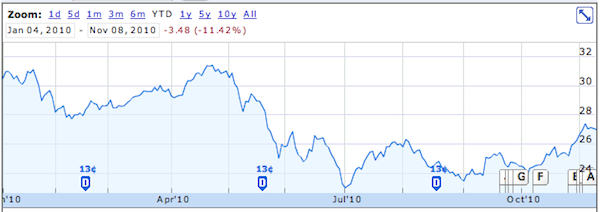By Joe Wilcox, Betanews

Perhaps he knows something you don't.
I've been asking myself the question all weekend, and now I'd like to pose it to you. I ask Betanews readers to respond to the poll below and to answer in comments; please do both. You can choose up to two answers. I wanted to leave an option for your own reasons, but I worry that trolls would be obnoxious. Sorry. If readers respond favorably, I'll do more polls like this. The poll expires on October 16, 2010 at Midnight PT. Embedded poll below requires JavaScript. If you have disabled JavaScript or otherwise can't see the poll, please go to this link.
Over three days last week, Ballmer unloaded 49.3 million shares for average price of $27.03, netting about $1.3 billion. It's as if Microsoft's CEO was saving up, looking for a lift in the share price -- perhaps even expecting that solid financial results for year to date or some recent new product releases would lift Microsoft share price. In late April, Microsoft's stock price climbed above $31 a share, before dropping to about $23 a share in early July. Only since Microsoft's fiscal 2011 first quarter financial report, on October 28th, have share prices consistently pushed above $26. Ballmer may have shrewdly picked about the best time to sell since April. The chart above shows Microsoft share price year to date.
But what if the share sale signals something else? It's a hefty volume, and Ballmer isn't done. He plans to sell about 75 million of his 408 million shares by end of year. That means about another 25 million share sales are coming; he owns 358,911,338 shares following last week's three sales. Has Ballmer lost confidence in Microsoft? Perhaps his confidence problem is with Wall Street, which as I explained yesterday would be justified; Microsoft's stock is moribund below $30. Gasp, could it be that Ballmer is on the way out, and he is unloading now ahead of time? Many Betanews commenters and investors posting elsewhere have demanded Microsoft dump Ballmer. Or could the sale simply be Ballmer rewarding himself for Microsoft's 2010 performance -- the old self slap on the back? Another: Ballmer's huge sale came right after the U.S. election. Perhaps he sees Republicans taking over the House of Representatives and split government as being bad for businesses like Microsoft.
What did Steve Ballmer suddenly sell 12 percent of his Microsoft shares?customer surveys
None of these are the reasons given in Ballmer's official November 5th statement: "Even though this is a personal financial matter, I want to be clear about this to avoid any confusion. I am excited about our new products and the potential for our technology to change people's lives, and I remain fully committed to Microsoft and its success."
Ballmer isn't the only Microsoft executive unloading shares. On November 1st, second-in-command Kevin Turner sold 48,956 shares for an average 27 bucks a piece; he also sold shares in September. Turner is by no means as large a stakeholder as Ballmer and owns 71,4801 shares following his recent sales. Microsoft Chairman Bill Gates also is unloading stock -- 2 million shares on November 2nd and another 1 million shares a day later, leaving him with 617,973,551 shares. Gates shares sold for $27.23 and $27.19, respectively. Three days later, Microsoft chief accounting officer Frank sold 15,000 shares for $27.13 a piece.
Perhaps the sales mean nothing; they're just routine. After all, the SEC restricts when top executives can sell stock. There are other considerations like when stock vests. Gates routinely sells his shares -- 12 million of them in early August. That's routine for Gates. But it's the volume of Ballmer's shares and percentage of them that draws questions to this sale. Then there is the man. What kind of confidence in Microsoft does the CEO generate by unloading 12 percent of his shares over three days, with more sales coming (if they haven't happened already but not been formally filed with the SEC)?
It's conspiracy theory Monday and your chance in comments to offer reasons behind Ballmer's stock sale and how -- or not -- his action affects your confidence in Microsoft.
Copyright Betanews, Inc. 2010







